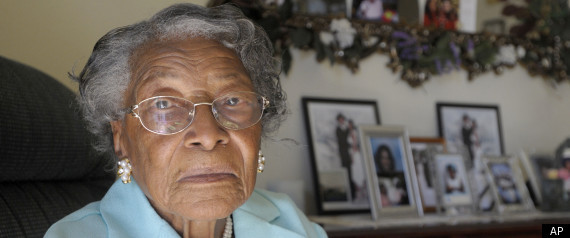By BOB JOHNSON
ABBEVILLE, Ala. (AP) — Nearly 70 years after Recy Taylor was raped by a gang of white men, leaders of the rural southeast Alabama community where it happened apologized Monday, acknowledging that her attackers escaped prosecution because of racism and an investigation bungled by police.
“It is apparent that the system failed you in 1944,” Henry County probate judge and commission chairwoman JoAnn Smith told several of Taylor’s relatives at a news conference at the county courthouse.
Taylor, 91, lives in Florida and did not attend the news conference. Family members said she was in poor health and was not up to traveling to Abbeville or speaking with reporters. But her 74-year-old brother Robert Corbitt, who still lives in town, was front and center and said he would relay the apology to his sister.
“What happened to my sister way back then … couldn’t happen today,” he said. “Boy, what a mess they made out of it. They tried to make her look like a whore and she was a Christian lady.”
Taylor, who is black, told The Associated Press in an interview last year that she believes the men who attacked her are dead, but she would still like an apology from the state. The AP does not typically identify victims of sexual assault but is using her name because she has publicly identified herself.

FILE – In this Oct. 7, 2010 file
photo, Recy Taylor, now 91, is seen her home in Winter Haven, Fla. Black
and white leaders from a rural southeast Alabama community apologized March 21, 2011 to relatives of Taylor, who was raped in 1944 by a
gang of white men who escaped prosecution because of what officials
described as police bungling and racism. (AP Photo/Phelan M. Ebenhack,
File)
Taylor was 24, married and living in her native Henry County when she was gang-raped in Abbeville. She was walking home from church when she was abducted, assaulted and left on the side of the road in an isolated area.
Two all-white, all-male grand juries declined to bring charges. Democratic State Rep. Dexter Grimsley of Newville said police bungled the investigation and harassed Taylor.
“I would like to extend a deep, heartfelt apology for the error we made here in Alabama,” Grimsley said Monday, looking straight at Corbitt. “It was so unkind. We can’t stand around and say that it didn’t happen.”
He said the statements from the mayor and the probate judge help to assure area residents that “that era won’t return to us.” He also said he is working on a resolution asking the state to apologize to Taylor.
Taylor’s story, along with those of other black women attacked by white men during the civil rights era, is told in “At the Dark End of the Street,” a book by Danielle McGuire released last year.
McGuire said Monday she would eventually like to see more formal apologies from the state, city and county, but views the statements from officials, prompted by publicity about her book, as a good first step.
“The fact that they are acknowledging that this happened is important,” said McGuire, a history professor at Wayne State University in Detroit.
The case got the attention of NAACP activist Rosa Parks in the 1940s, a decade before she became an icon by refusing to give up her seat on a Montgomery city bus. Parks interviewed Taylor in 1944 and later recruited other activists to create the “Alabama Committee for Equal Justice for Mrs. Recy Taylor.” Those efforts were later overshadowed by other civil rights battles.
Corbitt said he felt like his sister’s case was forgotten until he started doing some research several years ago and found out about the work that McGuire was doing. Mayor Ryan Blalock, who was among those apologizing Monday, said he had not heard about the case until recently.
“It felt good that the mayor said he is sorry about it,” Corbitt said.
Blalock got emotional when he told Taylor’s family that Abbeville is now a good place to live and that white people and black people respect each other and work and play together.
“My 8-year-old son has as many black friends as he does white friends,” said Blalock, who is white. “They are welcome at our place and he is welcome in their homes.”
http://www.huffingtonpost.com/2011/03/21/alabama-leaders-apologize-rape-1944_n_838814.html
No comments:
Post a Comment